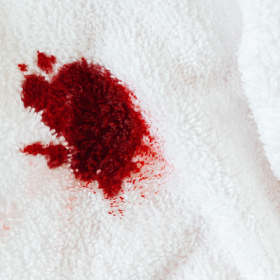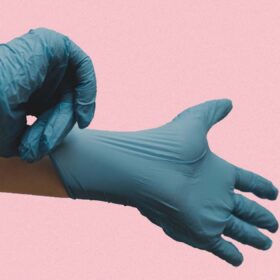
Do I have thrush or an STI?
In this article
What's the lowdown?
The symptoms of thrush overlap with the symptoms of some STIs
Thrush is not an STI, but can be triggered or exacerbated by sex
Thrush can be treated with antifungal medications in the form of oral tablets, pessaries or creams
Ways to prevent thrush include wearing loose underwear, avoiding harsh soaps and taking showers instead of baths
If you aren’t sure whether you have thrush or an STI, you should speak to your doctor or nurse
A lot of us have been there, and some of us more than a few times: thrush can be painful, uncomfortable and frankly inconvenient. What’s arguably just as inconvenient, though, is thrush’s profile of symptoms, and how similar they are to the symptoms associated with some STIs. It’s no surprise, then, that we often find ourselves asking the question: is it thrush or an STI?
Both thrush and STIs can affect both men and women, although women are more likely to get thrush, for reasons we’ll explain in a moment. Thrush can also occur in the mouth – it’s quite common in babies – and other parts of the body, but as women’s health is sort of our thing, we’ll be focusing on vaginal thrush here.
Do I have thrush or an STI?
First things first, it’s important to clarify: thrush is not an STI. While it can be triggered or passed on during sex, sex is far from the only way you can get thrush (and, in fact, isn’t very common at all). STIs, on the other hand, are passed from person to person through sexual activity, but can have similar symptoms to thrush, so it can be tricky to know exactly what it is you’re dealing with.
Similarities between thrush and an STI
Thrush shares its symptoms with some STIs, including discharge, itching and pain. Sometimes, a woman can believe she has thrush when in reality, it’s a different infection altogether. These shared symptoms, though, are where the similarities end.
Differences between thrush and an STI
Thrush is a fungal infection that’s at its happiest in a warm, damp environment, like the vagina (hence it being more common in women than men). It occurs from the overgrowth of a particular yeast called Candida (this is the reason you might have heard the term ‘yeast infection’). This yeast grows naturally in the bowel and small amounts of it live naturally in and around the vagina without causing any problems. It’s when the amount of this fungus gets too high that thrush occurs, and this usually happens due to an imbalance of bacteria that normally keep Candida in check within the vagina or vulva itself.
Thrush isn’t an STI, but friction during sex can cause minor damage and tears to the vagina or vulva, making Candida more likely to proliferate. If you’re pregnant, on antibiotics, or have a weakened immune system, you could be more likely to develop thrush.
STIs, on the other hand, are the result of viruses or bacteria. There are lots of different types, and you can read more about them in our dedicated STI guide.
Thrush can be recurrent, meaning you can experience multiple episodes of the infection and, despite treatment, it often returns. It is estimated that around 138 million women are affected by recurrent thrush every year.
Symptoms of thrush
Symptoms of thrush include:
- Unusual, white, cottage-cheese-like discharge
- Burning or pain while urinating
- Pain, itching, redness or swelling of the vulva
- Feeling pain or stinging during sex
Symptoms of an STI
There are many different STIs, and each has its own list of associated symptoms, which you can read about in our STI guide. Some common symptoms include:
- Unusual discharge
- Burning or pain while urinating
- Pain, itching, redness or swelling of your genitals
- Feeling pain or stinging during sex
- An unpleasant smell
- Abnormal bleeding
- Pain in the lower abdomen
What to do if you think you have thrush
If you’re pretty confident you have thrush, simple over the counter treatments or lifestyle changes may be all you need. If however you’re not sure, or you think you may be at risk of an STI, get checked out at your sexual health clinic or GP surgery.
Once you’ve established that it is thrush that you’re dealing with, there are several treatment options available to you. Depending on your circumstances, you can use a cream, pessary or tablet – or a combination of these. Symptoms should clear up within 7 to 14 days of starting treatment. Here’s a breakdown of each treatment and who it might be suitable for:
Thrush tablet
For most people, an oral antifungal medication is the best way to treat thrush. Fluconazole is the most common oral antifungal medication. It’s usually taken just once as a single dose and that’s it. Although this dose can be repeated if necessary. Occasionally, people experience side effects, the most common being nausea and diarrhoea. You shouldn’t take tablets for thrush if you are pregnant.
Thrush pessary
A pessary is a tablet that you insert into your vagina. The most common antifungal pessary medication is clotrimazole, which you’ll often find under the brand name Canesten which you can buy from Amazon (our affiliate link btw!). Clotrimazole is often recommended for pregnant women, as they cannot take oral tablets.
How many pessaries you take and how long for depends on the strength of Clotrimazole you are taking. A 500mg pessary, is commonly used just once as a single-dose treatment.
Like all medications, clotrimazole comes with potential side effects. These include swelling, pain or discomfort in or around the vagina, lower abdomen or pelvic pain, vaginal bleeding and stinging or burning after inserting the pessary. Most people don’t experience these side effects, and they should disappear once you have finished your treatment but speak to your doctor if they are severe or don’t go away.
Cream
Clotrimazole is available as an external cream as well as a pessary. The cream is applied externally to the vulva (not inside the vagina itself) and works to clear up external thrush and relieve symptoms. You can use an external cream at the same time as a pessary or tablet. The most common side effect of clotrimazole as an external cream is itching and burning of the area where it has been applied. Clotrimazole cream can clear up the symptoms of thrush in seven days, but it’s recommended that you keep using it for at least a couple of weeks to stop your symptoms returning.
Not sure if it’s thrush, or whether any of these treatments are right for you? We have doctors on hand who can give you impartial advice about your options or contact your GP or sexual health clinic.
What to do if you think you have an STI
If you suspect that you have an STI, your first port of call should be to go to your local sexual health clinic or GP for a screening. Here, your doctor or nurse might do a physical examination, a swab test or a blood test to see whether you have an STI. If you’d like to read more about different STIs and their symptoms, we have an article all about them – but remember, STI symptoms can overlap, and self-diagnosis is rarely helpful. You’ll usually need swabs to investigate and appropriate treatment from a healthcare professional. If you don’t have any symptoms but think you may be at risk of an STI, your sexual health clinic may provide a service where you can do your vaginal swab yourself. You can also speak to one of our brilliant doctors if you’re unsure and would like some advice.
Preventing thrush
There are certain environments in which thrush thrives, and particular behaviours can make it easier or more difficult for thrush to take hold. If you’re struggling with thrush, or are experiencing recurrent infections, it is recommended that you don’t use any harsh chemicals near the affected area, like soap or deodorant. Instead, the NHS recommends that you wash with an emollient, like E45 cream, and water. Try to take showers instead of baths, and be sure to dry off properly once you’ve washed, too; thrush thrives in warm, damp conditions.
The type of underwear you use can also impact your chances of getting (or re-getting) thrush; try to wear looser, cotton underwear where you can, and avoid tights or other clothing that sits tightly against your vulva. Lastly, if your thrush is painful or uncomfortable, avoid sex until it has cleared up to prevent making your symptoms worse.
Different types of contraception may increase your risk of thrush or recurrent thrush. For example, the oestrogen in the combined pill can be associated with thrush. Some coil users who suffer from recurrent thrush that won’t respond to treatment, may wish to look at other options using our birth control recommender.
Preventing STIs
STIs are passed on through direct physical contact; if your genitals come into direct contact with the genitals of someone with an STI (or the mouth or anus, in some cases), you put yourself at risk of catching it. The only way to really prevent the passing on of an STI is to use barrier methods of contraception (so-called because they put a barrier between you and the other person). There are two barrier methods that provide good protection against STIs: the female condom and the male condom. The male condom is better at preventing pregnancy than the female condom, and is generally considered the better option for STI prevention because it is easier to use.
What to do if you’re still unsure
If you’re still not sure whether what you’re experiencing is thrush or an STI, it’s important that you speak to a healthcare professional. This could be your GP or a doctor or nurse at your local sexual health clinic.
We also have some brilliant doctors here at The Lowdown. Each has a diploma in sexual and reproductive health on top of their medical degree and postgraduate GP training, and offers full twenty-minute appointments to make sure you’re given the space and time you need. If you decide to book a consultation with us, you’ll receive a full action plan after your appointment, detailing your next steps.
Our medical review process
This article has been medically reviewed for factual and up to date information by a Lowdown doctor.






